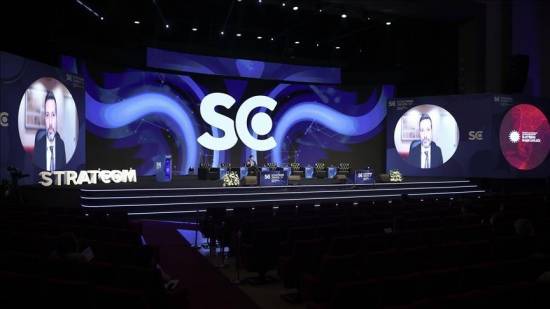Panel at Stratcom summit in Istanbul discusses how algorithms shape human life
The effects of algorithms on human rights were discussed on Sunday in a panel at the Stratcom summit 2021 in Istanbul.
In an address by video link, David Carroll of New York’s Parsons School of Design spoke on “How Algorithms Shape Human Life” moderated by Omer Kablan, a presenter at national broadcaster TRT World.
Asked about the social media companies saying “we are the product,” Carrol said: “This is the business model that was developed almost 20 years ago.”
He added: “The real customers to the platforms are not us, it is the legions of advertisers that increasingly rely on these platforms to acquire and maintain relationships with their customers.”
He explained: “We could say we are the product. But we can also say that the real customers don't have much choice either.”
Struggle for data control
Carroll was featured in the Netflix documentary “The Great Hack” trying to get back his data from Cambridge Analytica – a firm brought down by a scandal over data misuse – showcasing his advocacy for data rights.
He told the panel that this fight was about “testing the data protection regulatory regime.”
“Can it do what it says it can do and (get) an answer to human rights? And unfortunately, I don't feel that it succeeded,” he said.
“If we can't recover our data, then we certainly can't recover how algorithms are interfering with our expression of free will.”
Carrol said he started his Cambridge Analytica fight with “optimism” that it would be a place to find resolution, answers, and truth, but continued: “Unfortunately, the investigation was stymied and obstructed and never resulted in a conclusion, and the regulators never really succeeded at delivering satisfactory results. And so it means my personally feeling disappointed.”
“Ultimately, it took journalists, whistleblowers, leaders of the free press to hold accountable those who are supposed to hold accountable so we're still relying on sort of last resort of free press and whistleblowing. And I feel like that's a sign of a broken system,” he said.
Asked if people’s digital footprint might bite us in the future, Carroll answered: “I think the key thing that I learned is to appreciate fundamental differences between the approach of the EU and the US.”
He explained that EU laws see this information “still belongs to us and though it's out there and that we still maintain rights to it.”
“Whereas in the United States, it's a different philosophy,” he continued. “Once you put your data out there, you lose control of it.”
“I think that the European Union has a much more enlightened vision for this,” he said.
Stratcom
Turkey this weekend is hosting Stratcom 2021, an international gathering to address compelling policies, issues, challenges, and trends of the strategic communication ecosystem.
The two-day summit brought together 112 speakers from over 30 countries and a distinguished audience of over 3,000.
Topics tackled at the summit include strategic communication, public diplomacy, digital diplomacy, the metaverse, nation branding, disinformation, new media, open intelligence, new communication technologies and trends, strategic marketing, and political communication./aa


